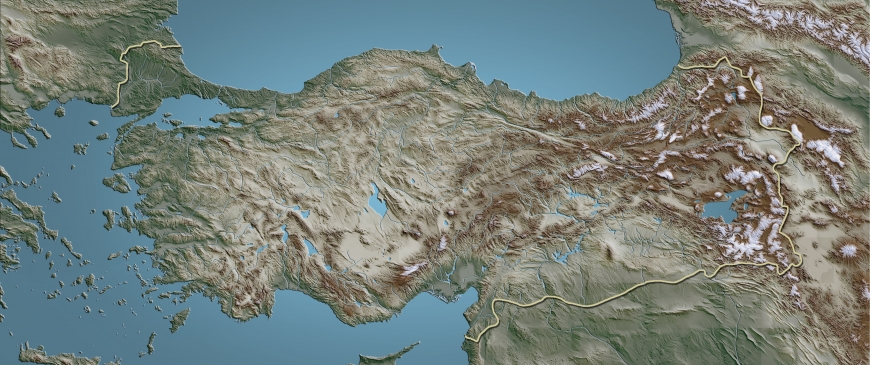
Now in EU interest to work with Turkey on migration
The European Union is facing the prospect of renewed migration crisis after Turkish president Recep Tayyip Erdogan declared he would "open the gates" and allow the over four million refugees living in Turkey to freely travel to Europe.
Josep Borrell, the EU's high representative for foreign affairs, has called an emergency meeting of European foreign ministers to discuss the situation this week.
But the EU's reluctance to take in hundreds of thousands more refugees means the bloc's best option is to try to renew migration cooperation with Turkey, even if this leaves a bitter taste in its mouth.
Erdogan's high pressure move follows an escalation of fighting in the northern Syrian province of Idlib in recent weeks after Syrian government forces, backed up by Russia, launched an offensive against the last rebel strongholds which have been defended by Turkish troops.
The Syrian advance has driven nearly a million refugees towards the Turkish border, and also claimed the lives of dozens of Turkish soldiers.
With no substantial Western support forthcoming, Erdogan upped the ante by announcing Turkey would no longer abide by the four-year-old refugee deal with the EU which was responsible for halting the flow of millions of Syrian refugees into Europe.
Under the 2016 deal, known as the EU-Turkey statement, the EU agreed to pay €6bn for Turkey to house Syrian refugees so they would not make their way into the EU.
The decision to open Turkey's borders, and 'weaponise' the refugees has significantly increased the pressure on the EU to provide Ankara with more funds to care for the refugees in Turkey, as well as providing more support in Syria.
Most of the funding from the 2016 deal has been allocated, and Turkey is anxious for more.
But negotiations over additional funds for the coming years have been held up due to broader disagreements between the EU and Turkey, including over Ankara's offensive against Kurdish groups in north Syria in October 2019 and its gas exploration off Cyprus.
Over the weekend, around 15,000 people tried to enter Greece from Turkey, and numbers could increase over the coming days and weeks, particularly if Turkish authorities push refugees to leave.
With its asylum system already under intense pressure, Greece announced it would not accept any asylum applications for a month, and pledged to protect its border with Turkey.
European leaders visited Greece to express support for Greece's actions, pledging to assist Athens in controlling its border, and promising €350m in support.
For now, the numbers at the border remain manageable, but they are bound to increase.
If rebels in northern Syria are defeated, this will result in millions of refugees pouring into Turkey and trying to reach Europe.
There is no appetite in the EU to accept another large scale influx: member-states fear a repeat of the crisis of 2015-16 which led to bitter disagreements between European governments and the rise of populist right-wing parties.
A renewed migration crisis, at the same time as the EU is scrambling to contain the spread of coronavirus and limit its economic damage, has the potential to further boost right wing eurosceptic parties across Europe and to deeply strain the Union's internal cohesion.
The EU's unwillingness to take in large numbers of refugees means it faces a choice between trying to prevent them from entering its territory, or renewing cooperation with Turkey to help it care for the refugees it is hosting.
This should not be a hard decision to make.
Repelled by force?
Europe should be under no illusion as to what repelling refugees at the border will mean in practice: it will require a sustained effort, and will likely necessitate the use of force.
And ultimately, even major pushback efforts could prove unsustainable if the numbers trying to get into the EU grow substantially.
What is more, EU-Turkey co-operation in migration has worked relatively well since the multi-billion euro agreement in 2016, even though the two sides have fallen out over other issues in that period.
Contrary to what is often believed, the EU did not simply hand the cash over to the Turkish government.
Instead, the EU's €6bn Facility for Refugees in Turkey transferred funds to a range of organisations to support refugees in the country, paying for their education, housing and healthcare.
Despite its fraught relations with Turkey, it is in the EU's interests to try to renew cooperation with Ankara.
The best option to defuse the current crisis and prevent a new migration crisis would be for the EU to reassure Turkey that it will continue support for refugees in the coming years, providing it with additional funds, while ensuring EU funds are not used to resettle Syrian refugees in Ankara's proposed 'safe zone' in Syria.
Member states should also offer to take in more of the most vulnerable refugees from Turkey.
A renewed effort to patch up the EU's migration deal with Turkey will not tackle the root cause of the surge in refugees – the war in Syria, from which Europeans cannot insulate themselves.
But as long as Europe remains unwilling to become more actively engaged in solving the Syrian conflict, helping Turkey manage the influx of refugees is the best way the Union can help itself avoid a fresh migration crisis.
Luigi Scazzieri is a research fellow at the Centre for European Reform.
